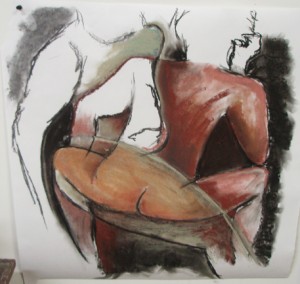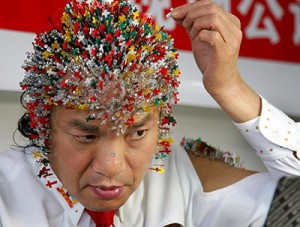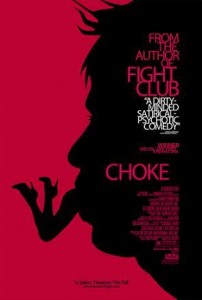 I’m currently reading Madness: A Bipolar Life by Marya Hornbacher. In pondering her descriptions of mood swings during bipolar illness, I recognize the characteristics of mania and depression. The racing mind…so many thoughts rushing that you just can’t grab on to one long enough to do something with it. The depression that hits almost as a result of not being able to grab onto one thought and move forward.
I’m currently reading Madness: A Bipolar Life by Marya Hornbacher. In pondering her descriptions of mood swings during bipolar illness, I recognize the characteristics of mania and depression. The racing mind…so many thoughts rushing that you just can’t grab on to one long enough to do something with it. The depression that hits almost as a result of not being able to grab onto one thought and move forward.
It makes me wonder if some mental illness is made up of what we all go through, but taken to an extreme, interfering with your daily functioning. The brain not being able to manage normal processes until your capacity to control it has been completely usurped.
I recently described my mind as a ping-pong match between the right and left sides of my brain. But neither scores, and neither wins. I suppose a ping-pong game seems balanced. And my game probably is, in the sense that my left and right are both active and vibrant. But they battle…back. And forth. And back. And forth.
A Stroke of Insight
Neuroanatomist Jill Bolte Taylor literally experienced this battle during a stroke. She described her experience vividly during a TED talk. A hemorrhage in the left side of her brain caused her consciousness to exist almost fully in her right brain, completely changing her perception of her body, the world around her, and of reality. Alternating between left brain perception, and what she calls “la la land”, she eventually worked out a way to plan for the shifts between hemispheres and got herself some help.
“Imagine what it would be like to be totally disconnected from your brain chatter”
Ms. Taylor experienced this through her stroke. Artists experience this during their work, becoming engrossed in the creativity involved while they create. I once had a drawing teacher who said that when she was going to work on a drawing, she told her family she was “going under.” She was about to become part of her right brain…the creative, sensual, emotional part of herself that she accessed to create artwork that flowed from her. It’s difficult to communicate with someone in this state. It takes time for them to transition back into allowing the left brain to function and access the language portion of the brain. And often when this occurs, the creative spell is broken.
Alternatively, accessing this creative state can be extremely difficult. Last fall I took a weekend drawing and painting workshop with Tim Hawkesworth. Tim is a fabulous artist and teacher who encourages artists to reach within and express who they are. Even with his guidance and inspiring morning talks, I struggled the entire first day of the workshop. I was approaching art with my left brain. With the help of his associate who gave me a massage and talked me through my struggle, I was able to relax. I finally made the conscious decision to stop fighting myself and was able to produce work that surprised me.

I had never done work like this before. I didn’t know it was in me. It was exciting, fulfilling, invigorating. And yet, I haven’t produced anything since. Although it’s always hovering in the “back” of my mind. The necessity of left brain activity in my regular work day keeps me from delving into the intangeable right. I battle every day. That practical chatter cannot justify my taking the time necessary to transition to the “la la land” where my art emerges.
And yet, I love my left brain. Not only am I able to think things through to conclusion, understand words and numbers, and troubleshoot problems, I need my left brain to contain the energy that comes from the beauty of my right. The next step is to learn how to manage the back…and forth. Jill Bolte Taylor was able to determine a plan while in the midst of stroke.
I need my right to allow the left to do its work: creating structure that allows me to function properly, accomplishing what I have to as well as what I want to; managing my time so I can create the space I need for my right brain to flow; planning my finances and the steps I need to take to acquire income that will allow me to explore my right brain, as well as develop my left; and allowing my right brain the freedom to roam.
 “Suppose that we carry a magnetic compass about in the neighbourhood of powerful magnets. The needle waggles as we move and comes to rest pointing in a new direction whenever we stand still in a new position.
“Suppose that we carry a magnetic compass about in the neighbourhood of powerful magnets. The needle waggles as we move and comes to rest pointing in a new direction whenever we stand still in a new position. I recently finished the book Choke by Chuck Palahniuk. It is about Victor Mancini, a man trying to understand his world, the world, through the clouds of sex addiction and his mother’s slow decline. But Victor’s not the only one. His best friend, Denny, is also working his way through his addictions, and Dr. Paige Marshall, an acquaintance at his mother’s nursing home, is trying to understand through genetics.
I recently finished the book Choke by Chuck Palahniuk. It is about Victor Mancini, a man trying to understand his world, the world, through the clouds of sex addiction and his mother’s slow decline. But Victor’s not the only one. His best friend, Denny, is also working his way through his addictions, and Dr. Paige Marshall, an acquaintance at his mother’s nursing home, is trying to understand through genetics.